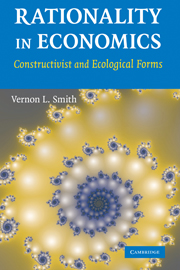Book contents
- Frontmatter
- Contents
- Preface
- Acknowledgments
- Introduction
- PART I RATIONALITY, MARKETS, AND INSTITUTIONS
- PART II IMPERSONAL EXCHANGE: THE EXTENDED ORDER OF THE MARKET
- PART III PERSONAL EXCHANGE: THE EXTERNAL ORDER OF SOCIAL EXCHANGE
- 9 Emergent Order without the Law
- 10 The Effects of Context on Behavior
- 11 Investment Trust Games: Effects of Gains from Exchange in Dictator Giving
- 12 Reciprocity in Trust Games
- PART IV ORDER AND RATIONALITY IN METHOD AND MIND
- References
- Index
9 - Emergent Order without the Law
Published online by Cambridge University Press: 18 May 2010
- Frontmatter
- Contents
- Preface
- Acknowledgments
- Introduction
- PART I RATIONALITY, MARKETS, AND INSTITUTIONS
- PART II IMPERSONAL EXCHANGE: THE EXTENDED ORDER OF THE MARKET
- PART III PERSONAL EXCHANGE: THE EXTERNAL ORDER OF SOCIAL EXCHANGE
- 9 Emergent Order without the Law
- 10 The Effects of Context on Behavior
- 11 Investment Trust Games: Effects of Gains from Exchange in Dictator Giving
- 12 Reciprocity in Trust Games
- PART IV ORDER AND RATIONALITY IN METHOD AND MIND
- References
- Index
Summary
… all early “law-giving” consisted in efforts to record and make known a law that was conceived as unalterably given. A “legislator” might endeavor to purge the law of supposed corruptions, or to restore it to its pristine purity, but it was not thought that he could make new law. … But if nobody had the power or intention to change the law … this does not mean that law did not continue to develop.
Hayek (1973, p. 81)In one work (Theory of Moral Sentiments) we have a theory of the way in which “sympathetic transfers of feeling” set limits to the assertion of individual interests and promote social harmony: partly by creating moral sentiments in the minds of individuals which directly modify their conduct, and partly by causing society to evolve a legal system that expresses the moral sentiments common to the mass of mankind, and imposes restraints which not every individual would always impose on himself. In the other work (Wealth of Nations) we have a theory of the way in which individual interests, thus limited, themselves promote economic adjustment and harmony. The two treatises therefore give us complementary halves of [Adam] Smith's social philosophy.
Overton Taylor (1930, p. 233, quoted in Caldwell, 2003, p. 356)Rules and Order
The early “law-givers” did not make the law that they presumed to “give”; rather, they studied social traditions, norms, and informal rules and gave voice to them, as God's, or natural, law.
- Type
- Chapter
- Information
- Rationality in EconomicsConstructivist and Ecological Forms, pp. 192 - 198Publisher: Cambridge University PressPrint publication year: 2007



